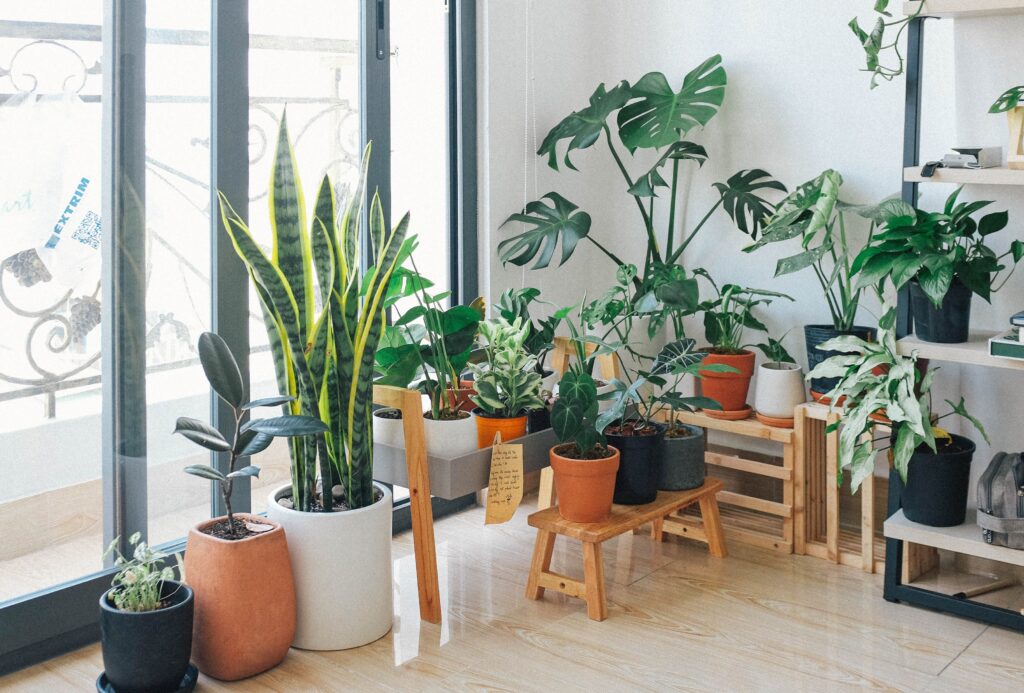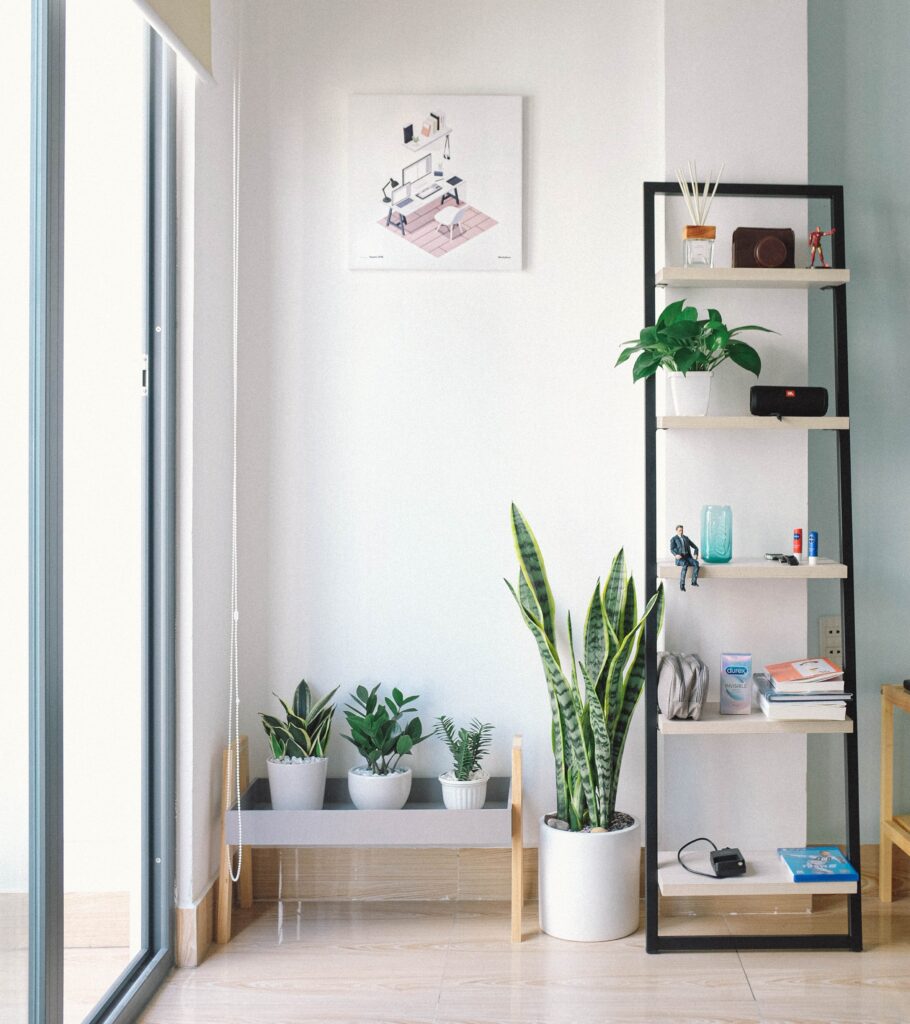The Best Plants to help Relieve Stress

In today’s hectic world, it’s more important than ever to find ways to relax and unwind. According to a recent study, one of the best ways to do this is to surround yourself with plants. Having plants in your home has been shown to reduce stress levels, improve moods, and boost productivity. Not only that, but they can also help to purify the air, making your home a healthier place to be. So if you’re looking for a way to relax and de-stress, be sure to add some plants to your home. You’ll be glad you did!
Table of Contents
Relaxing plants can help purify the air in your home.
The air quality in our homes has a direct impact on our health and wellbeing. Dust, pollen, mold, and other airborne contaminants can cause a range of health problems, from sneezing and coughing to headaches and difficulty breathing. Relaxing plants can help purify the air in your home and improve your health. Plants take in carbon dioxide and release oxygen, which helps improve air quality. They also help to remove harmful chemicals from the air, including formaldehyde, benzene, and trichloroethylene. Relaxing plants can help reduce the risk of allergies and respiratory problems. Not only do relaxing plants improve air quality, but they can also help reduce stress and promote wellbeing. If you’re looking to improve the air quality in your home and promote relaxation, consider adding some relaxing plants to your décor.
They can help boost your mood and create a more positive atmosphere.
If you’re looking for ways to make your home feel more relaxing, Plants can help boost your mood and create a more positive atmosphere, both of which can be helpful in making your home feel more relaxing. There are a number of ways that plants can help improve your mood and create a more positive atmosphere. For one, plants can help purify the air, removing toxins and improving the quality of the air you breathe. In addition, plants can also help to increase levels of humidity, which can be helpful in combating dryness and creating a more comfortable environment. In addition to improving the quality of the air you breathe and increasing humidity, plants can also help reduce noise levels. This can be particularly beneficial if you live in a noisy area or have young children in the home who can be disruptive. The sound of plants can help to create a sense of calm, which can be helpful in making your home feel more relaxing. If you’re looking for ways to make your home feel more relaxing, adding plants is a great option. Not only can they help to improve the quality of the air you breathe and increase humidity, but they can also help to reduce noise levels and create a more positive atmosphere.
Relaxing plants can help reduce stress and anxiety levels.
When it comes to finding ways to relax and reduce stress, there are a lot of options out there. Relaxing plants can help reduce stress and anxiety levels in a variety of ways, making them a great addition to any home. One of the main ways that relaxing plants can help reduce stress is by providing a visual and tactile distraction. When you are feeling stressed, anxious, or overwhelmed, looking at and touching a plant can provide a much-needed distraction from whatever is causing you distress. The act of caring for a plant can also be calming and therapeutic, giving you a sense of purpose and helping to ground you in the present moment. Also, many people talk to their plants or name them. I always talk to my plants; they are my sounding board, and I tend to believe they listen and will do their best to make me happy. So adding plants to your home or office can help to improve your overall mood and make it easier to breathe, both of which can help to reduce stress levels. If you are looking for ways to reduce stress and anxiety, adding some relaxing plants to your home is a great option. Not only can they provide a visual and tactile distraction, but they can also help improve the air quality in your home. So, whether you are looking for a plant to help you relax or you are just looking for ways to improve the air quality in your home, adding some plants is a great option.
They can also help improve your sleep quality.
It’s no secret that plants can have a positive impact on our mental health. In fact, research has shown that simply being around plants can lead to lower levels of stress and anxiety. But did you know that plants can also help improve your sleep quality? There are a few different ways in which plants can help you sleep better. For one, plants can help purify the air around you, as we mentioned earlier, but this is important because quality sleep requires breathing in clean air. Additionally, plants can help reduce noise pollution. This is important because noise pollution can lead to restless sleep. But perhaps the most important way in which plants can help you sleep better is by promoting a sense of calm. This is because plants can help lower your cortisol levels. Cortisol is a stress hormone that can interfere with sleep. So, by promoting a sense of calm, plants can help ensure that you get a good night’s sleep. There are a number of different plants that can help you sleep better. Some of the most popular include lavender, chamomile, and valerian root.
Additionally, they can help increase your productivity levels.
When it comes to productivity, it’s often said that we should aim to work smarter, not harder. But what does that actually mean? In practical terms, it means finding ways to work more efficiently so that we can get more done in less time. And one way to do that is to surround ourselves with plants. Studies have shown that there are a number of benefits to having plants in the workplace. For starters, they can help reduce stress levels. This is important because when we’re feeling stressed, it’s harder to focus and be productive. Relaxing plants can help to create a more calming environment, which can in turn help us to be more productive. In addition to reducing stress, plants can also help boost our mood and energy levels. This is likely due to the fact that they help improve air quality. When the air we’re breathing is stale and stagnant, it can make us feel sluggish and unfocused. But when the air is fresh and crisp, it can help energize and motivate us. Plants can help to purify the air and improve its quality, which can in turn help us to feel better and be more productive. So if you’re looking for ways to increase your productivity, surround yourself with relaxing plants. They can help reduce stress, boost your mood, and improve the quality of the air you breathe. All of which can lead to a more productive you.
List of Plants to keep in your house



Lavender
- Relaxing Effect: Known for its calming scent.
- Air Purification: Helps to purify the air.
- Uses: Place a pot of lavender in your bedroom or use lavender essential oil for aromatherapy to promote relaxation and better sleep.
Snake Plant
- Air Purification: the snake plant releases oxygen at night, promoting better air quality and sleep.
- Low Maintenance: Can survive in low light and less water.
- Uses: Place a snake plant in your bedroom to improve air quality during the night.
Peace Lily
- Air Purification: Removes airborne toxins.
- Aesthetic: Beautiful white flowers.
- Uses: Keep a Peace Lily in high-traffic areas of your home to purify the air and add a touch of beauty.



Spider Plant
- Air Purification: Effective in removing pollutants.
- Pet-Friendly: Non-toxic to pets.
- Uses: Hang spider plants in various parts of your home for a touch of greenery and air purification.
Aloe Vera
- Air Purification: Removes formaldehyde and benzene.
- Healing Properties: Gel can be used for skin ailments.
- Uses: Keep an Aloe Vera plant on your work desk or in living areas to benefit from its air-cleaning properties.
Jasmine
- Relaxing Effect: The scent helps to improve sleep quality.
- Aesthetic: Produces beautiful flowers.
- Uses: Place a jasmine plant near windows or entrances, allowing its scent to permeate the room



Boston Fern
- Air Purification: Good for removing pollutants like xylene.
- Humidity: Helps to maintain indoor humidity levels.
- Uses: Consider placing it in a living room, hallway, or any other frequently used space where its beauty can be appreciated.
Rubber Plant
- Air Purification: Removes airborne toxins.
- Low Maintenance: Requires less care.
- Uses: Given its aesthetic appeal, consider placing the Rubber Plant in a living room, office, or hallway where it can be a focal point.
Jasmine
- Relaxing Effect: The scent helps to improve sleep quality.
- Aesthetic: Produces beautiful flowers.
- Uses: Place a jasmine plant near windows or entrances, allowing its scent to permeate the room



ZZ Plant
- Air Purification: Effective in air cleaning.
- Low Maintenance: Survives in low light conditions.
- Uses: The ZZ plant can be a calming presence in bedrooms, and its air-purifying qualities can contribute to a healthier sleeping environment
Chamomile
- Relaxing Effect: Known for its calming properties.
- Edible: Can be used to make herbal tea.
- Uses: If you have a relaxation or meditation space, a potted plant or in the form of dried flowers is beneficial for a calming atmosphere .
Placement and Care: To make the most of these stress-relieving plants:
- Placement: Ensure that you place these plants in areas where you spend the most time, such as the living room, bedroom, or office.
- Care: While these plants offer numerous benefits, they also need care. Ensure they receive the right amount of sunlight and water.
- Diversify: Don’t limit yourself to just one type. Incorporate a variety of these plants to maximize the benefits and beautify your space.
So just remember, nature has a unique way of healing and rejuvenating us. By incorporating these stress-relieving plants into our homes and workspaces, we can create a more relaxed, healthy, and harmonious environment. So, the next time you feel overwhelmed, take a moment to sit by your plants, breathe deeply, and let nature work its magic.
If you want to continue building a relaxing home, check out our article on Home Sanctuary, “How to create a Home Sanctuary with 20 Amazon Products.”
